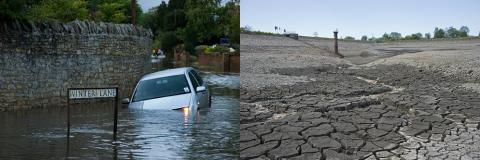A consortium led by the UK Centre for Ecology and Hydrology (UKCEH) began a 15-month study in May 2020 to scope the requirements for a new national NERC Floods and Droughts Research Infrastructure. This £500k investment seeks to understand the data that are required to improve the prediction and mitigation of floods and droughts nationally, and the infrastructure required to enable these measurements to increase the UK’s resilience to such events.
Floods and droughts have dramatic consequences for UK homes and businesses; annual damage to UK properties and their contents due to river and tidal flooding is estimated to total approximately £1bn. Despite the wide-ranging effects of such extreme hydrological events, businesses, industry and researchers lack much of the fundamental data required to fully understand the long-term impacts, as well as the underlying environmental conditions which may exacerbate or limit their occurrence.
The scoping study will be consultative, collecting views via webinars and workshops from a broad range of stakeholders and end-users, including the academic community, businesses, landowners, government and regulatory agencies. The study will undertake a broad review of past and ongoing flood and drought monitoring programmes to better understand existing infrastructure both in the UK and internationally. It will additionally consider the benefits of potential investments, such as the establishment of networks of sensors in catchments throughout the UK and the development of near-real time data to increase understanding of extreme hydrological events.
Dr Nick Reynard (Head of Hydroclimate Risks) and Dr Gwyn Rees (Head of Water Resources) from UKCEH will lead the study, in collaboration with researchers at the University of Bristol, Imperial College London, and the British Geological Survey (BGS).
Dr Iain Williams, Director of Strategic Partnerships at NERC, said: “This is an exciting investment for NERC. Extensively scoping this programme and reaching out to a wide range of stakeholders with an interest in flood and drought resilience will enable us to understand and develop the case for further investments across all regions of the UK. Such long-term national infrastructure will help us meet the demands of adapting to a changing climate and improve the UK’s resilience to extreme hydrological events.”
Professor David Hannah, Professor of Hydrology at the University of Birmingham and the scoping project’s independent Steering Committee Chair, said: “I am pleased to be involved in this exciting scoping study; it will engage widely with the diverse communities researching floods and droughts. This work is much needed to better understand complex hydrological processes. A future investment in a national floods and droughts research infrastructure will deliver truly transformative science with benefits for societal resilience under anticipated hydrological variability and change.”
For further information, please contact Rebecca Smith via capitalrequirements@nerc.ukri.org
Read the National Infrastructure Commission’s report, Anticipate, React, Recover: Resilient Infrastructure Systems (published May 2020)
Image credit: ProjectB/GettyImages (left) / Thailandphoto/GettyImages (right)

